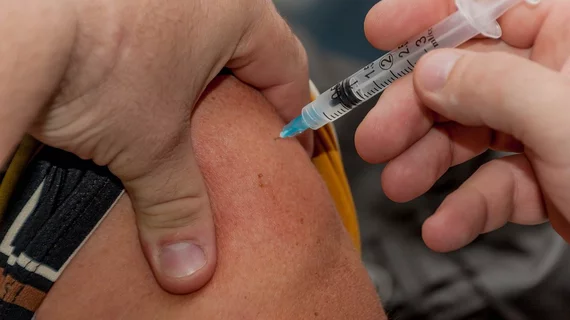Receiving the flu vaccine could improve cardiovascular and all-cause mortality outcomes in patients with heart failure (HF), according to a large-scale study of Danish citizens published Dec. 10 in Circulation.
First author Daniel Modin, MB, of Copenhagen University Hospital Gentofte, and colleagues said in the journal that while physicians know the flu can be a serious diagnosis for HF patients—who are, on the whole, older and more frail—they’re not sure how vaccination fits into the equation.
“In daily clinical practice, the question of any influenza vaccine versus no vaccine remains up for debate,” Modin and coauthors wrote. “Although a few studies have indicated beneficial effects with influenza vaccination in patients with HF, several questions remain about the effect of the cumulative number of vaccinations, the importance of vaccination frequency, vaccination timing and whether a dose-response relationship applies.
“If influenza vaccination significantly improves survival in heart failure, perhaps it should be given more emphasis in heart failure guidelines.”
That’s not to say it’s ignored, the authors wrote—the European Society of Cardiology, American College of Cardiology and American Heart Association all recommend annual flu shots for HF patients. But those recommendations are backed by scant evidence, and our best data is still preliminary.
To add to the current body of research, Modin and his team performed a nationwide cohort study of 134,048 adults in Denmark who were diagnosed with HF between 2003 and 2015. Using national registries, the researchers compared HF outcomes with the number and frequency of flu vaccines each patient received.
Over a median follow-up of 3.7 years, vaccination coverage in the study population ranged from 16 percent to 54 percent, the authors reported. After adjustment for inclusion date, comorbidities, medications, household income and education level, receiving at least one vaccination during the study period was linked to an 18 percent reduced risk of death, both all-cause and cardiovascular-specific.
Modin et al. said a greater cumulative number of vaccinations was associated with a larger reduction in mortality risk compared to intermittent vaccination, and patients who received their flu shots earlier in the year (between September and October) saw better outcomes.
“Vaccination early in the season may be more efficient for preventing influenza infection because the patient is allowed less time during the season to contract influenza before vaccination,” the authors wrote. “An influenza vaccination may exacerbate heart failure symptoms and possibly advance the progression of the disease. Thus, if multiple episodes of infection are prevented by multiple vaccinations, it is possible that the patient is spared unnecessary disease progression caused by multiple influenza infections, and this may explain in part why a greater cumulative number of vaccinations was associated with greater reductions in mortality.”
Modin and colleagues said their work is limited since they only had information on vaccines administered by general practitioners in one country, but it’s a step in the right direction.
“Currently, little is known about the effect of influenza vaccination on survival in heart failure,” they wrote. “Our study suggests that influenza vaccination may improve outcome in patients with heart failure, but because this was an observational study our results must be replicated in randomized clinical trials before finite conclusions can be drawn.”

